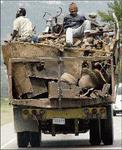
Ian Allen/Staff Photographer
A truck transporting scrap metal slowly travels along Nelson Mandela Highway. Scrap metal exports have fallen 75 per cent in the past few months.
Dionne Rose, Business Reporter
With the Government reporting up to a 75 per cent fall-off in the export of scrap metals, the local export industry, with the potential to earn some US$100 million in foreign exchange (more than J$8 billion), has all but collapsed.
"There is nothing happening because there has been a dramatic reduction in demand for scrap metal," Industry and Commerce Minister Karl Samuda said of the dramatic downturn.
"The two main sources for scrap metal are China and India, and they are both practically dried up."
But as middlemen count their mounting losses and some traders contemplate fleeing the business, one group is basking in the negative market conditions.
Local foundry operators - the people who manufacture Dutch pots, manhole covers and cast-iron building columns - are viewing the drying up of the scrap metal export markets as a blessing, reopening their supply sources, which dried up following the rise of exports a few years ago.
Legitimate players
China, the largest buyer of the product needed as raw materials for its mega steel mills, is experiencing a slowdown in its economy and a depression in demand.
In the United States, industry sources say steel mills and foundries are paying around US$100 per gross ton for No. 1 heavy-melting steel scrap delivered to their facilities, a far cry from the US$520 per gross ton paid last summer.
"It is very slow in that industry now, so you find that the legitimate players in the business are stuck with materials piled up in their yards and there is no movement," Samuda told the Financial Gleaner.
The problem, he said, cannot be solved through local action.
"We are very concerned about it because that industry had a potential to earn over US$100 million in foreign exchange and now that has fallen off. We continue to monitor it, but the prospects under the present world conditions are not particularly good."
No one knows the extent of the crisis better than small scrap metal traders.
"It is really bad," said Kingston-based trader, Delroy Heslop.
"I spend a lot of money on the metals and I can't get anybody to buy it."
Heslop, who has been in the business for two years, said the price for metal has plummeted from a high six months ago of $7,000-$8,000 per ton, to between $1,600 and $3,000 per ton.
Having acquired materials in the hope of continued robust sales, Heslop says he has lost over J$100,000 in the last few months with the downturn in the market.
But Heslop's misfortune and that of his colleagues' misfortune has thrown a lifeline to local foundries that use white metals, notably aluminum.
"We have been in the business for some 50 years and the growth in export markets pushed local raw-material prices out of our reach to the extent that we were about to close down the operation," said Blacent Green, owner of Mould Foundry in Woodside, Clarendon.
When the scrap metal trade took off some three years ago, aluminum scrap soared from US$5 per pound to stratospheric levels of up to $US90 per pound, Green told the Financial Gleaner.
The mainly small-scale collectors deserted the local foundries and lined up to sell to exporters, who were shelling out the higher prices.
Since last September, however, sellers were forced back to their initial markets here at home, selling again to foundries at the old price of US$5 per pound in some instances.
According to Trade Board data, 31 scrap metal licences, reflecting business value of US$225,088, were granted in November last year - tumbling from 65 licences with business value of US$7.4 million in November 2007 - when a new, stricter regime for the regulation of the industry was introduced by the State.
Overseas sale
Trade Board data indicate that the slide in the local scrap metal export industry started in June 2008, when the number of licences granted for overseas sale of the commodity moved from 235 in May to 81 in June.
While there was a brief upturn in August and September, the decline was sustained thereafter. Now, scrap metal sales are picking up, though prices remain low.
Heslop says there is renewed activity in the market, but he is still selling scrap metal at "far less than what I bought it for".
Kenneth Barclay, another middleman, has often thought of cutting his losses and getting out of what is now for him, an unprofitable business.
"You are afraid to touch any metal right now because it don't make sense. The price on the market right now is a joke," he scoffed.
Despite that recognition, Barclay, like others, keeps hoping for a turnaround sometime soon. "I have said a couple of times I would get out, but then, if you can make a dollar (you remain). I don't know how long this will go on for but I am not giving up yet," he said.
dionne.rose@gleanerjm.com